|
New Ship Ordered For May 1 As I-B Moves Towards Finish
List Only 3,800 Men Remaining In Early May A ship with 2,500 capacity has been requested for May 1, Roundup learned from Theater Headquarters this week. If this ship sails during the first week of May, as is hoped, the I-B Theater will then have a personnel of only about 3,800, spokesmen said. It had been previously believed that the first May ship would be requested at a date about two weeks later, but progress in the transfer of surplus property, particularly in Assam, made possible the earlier date. The actual arrival date of the first ship in May still awaits confirmation from the War Department. JUNE 30 CRITERIA Theater Headquarters also announced that men eligible to go home under the June 30 criteria (40 points or 24 months of service as of June 30) would begin to leave as early as April 21 on the General Hersey. It is expected that most men eligible under the April 30 standards (45 points or 30 months of service as of April 30) will be gone by the sailing of the first April boat, the General Sturgis on April 12. The sailing of the Marine Jumper has been moved up from March 22 to March 20. The Marine Cardinal is still slated to leave on March 24. Departure dates for April - the General Sturgis on April 12 and the General Hersey on April 21 - remain unchanged. DESTINATION UNKNOWN Whether the May ship will sail to the Atlantic or Pacific coast is not yet known. The two General ships for April, as previously announced, will dock in New York. The sailing of the General Hodges in early March left Theater strength at approximately 19,000. Further March sailings will bring the number of men here to about 12,000 on April 1. |

|
Speed Forecast In Transfer
Of I-B Surplus Property
Roundup Staff Article
Optimism about the speed with which surplus property can be transferred to the Indian government prevailed in both American and British circles this week as a result of a tour of Assam and Bengal by Col. A. C. Welling, U.S. Theater G-4, and Maj. Gen. E. Wood, representing British General Headquarters for India.
It is now estimated that the turnover of property in Assam will be completed by April 1, said Welling on his return to New Delhi, and that the evacuation of American personnel there can be finished by April 15.
The colonel said that the general, after seeing the condition of the warehouses, remarked that work which he had hitherto imagined would require days would actually only be a matter of hours.
Air Force property outside of Assam will be turned over directly to Tata Air Lines, Roundup was told. It is hoped that this transfer will be completed by the end of April.
ASF SURPLUSES
The bulk of Army Service Force surpluses in the Calcutta area should be transferred by April 15, Welling said, but the final date for complete transfer of all U.S. surpluses in Bengal will probably not be before May 1.
The colonel stated he was particularly anxious to commend the men and officers in Assam for the job they had done in warehousing and inventorying the surplus property.
He said he was amazed at the present orderliness and efficiency of the installations after having seen them during the difficult days of war.
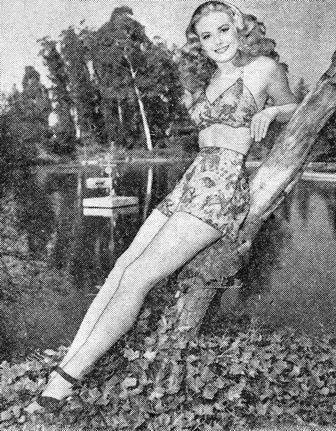
|
Headquarters Plans To Move Next Month
Roundup Staff Article
India-Burma Theater Headquarters will move from New Delhi to Calcutta some time in April, Roundup learned this week. ADMAC on a reduced scale will remain behind in New Delhi.
Contrary to reports in the Indian press, it has not been possible as yet to set a final date for the move, Theater Headquarters stated. While for planning purposes April 15 is being used as the date, spokesmen stressed that the move might take place earlier or later.
They pointed out that Headquarters must remain in New Delhi in order to maintain most efficient contact with the Indian government, FLC and GHQ India, particularly regarding the transfer of surplus property purchased under the recent FLC agreement.
Reciprocal Aid To India Ends
All cash reimbursable reciprocal aid to the Government of India from the U.S. halted on March 2, Roundup learned from Theater Headquarters this week.
The reciprocal aid program on a cash basis was the success to Lend-Lease which ended last September. With the sudden end of Lend-Lease, supplies were kept available to India on the basis of cash settlements between the governments of the U.S. and India for a six month period, which ended in March.
Headquarters spokesmen told Roundup that from now on no items can be furnished to India except such as are directly necessary to the fulfillment of the Army's mission here. Financial settlements for these transactions are made locally.
The ending of reciprocal aid by the U.S. raises the problem of the future of the reverse aid program by which the Army has been receiving from the Indian government the bulk of its buildings, labor, rail transportation, much of its food and similar items. Discussions are currently underway to ensure the continued smooth supply of the Army here.
Karachi 'Ghost' Station Entertains Men From Shelter
KARACHI - After VU2ZX, the local AFRS radio station went off the air Jan. 28, the several hundred AAF personnel remaining at the Karachi Air Base knew they were going to miss the entertainment.
It didn't take long for S/Sgt. Bill Todd to figure out what to do. With the approval of Lt. J. K. Lazrus, Bill went to work and installed a turntable and public address equipment in a bomb proof shelter near the air strip. Loudspeakers were placed in the barracks.
AACS men volunteer to run the "radio station" on the off-duty time, while an Indian assistant helps out at other times, keeping complete recorded programs of AFRS going from 8:30 a.m. to 11:30 p.m. daily. The 167th MP Disposal Unit on the other side of the field also uses the recordings to put over its loudspeaker system.
JEEP, M-I, JAMMED
NEW DELHI - Gol durned if it didn't happen to the Provost Marshal himself !
One perfectly good jeep with large white letters designating its ownership as that of Capt. C. V. Clark, ADMAC Provost Marshal, was "removed" last week from inside the officers barracks on Curzon Road and "deposited" around a tree on Qutah Road outside of town.
The jeep is now slightly curvical, has its axle broken and both windshields are shattered. But the words "Provost-Marshal" are still there.
The name of the party responsible was not announced.
Circus Coming To Calcutta
CALCUTTA - An Indian version of the "Big Top" will be presented to GI's April 1 and 2 here at Monsoon Square Garden. Tigers, lions, clowns and girl's in strange and eerie acts are part of the Great Eastern Circus which is renowned as the "Biggest Show in the East."
Open free to GI's, the show features flying trapeze acts, a human whale = "the mysterious man who devours living fish," the Indian Rope Act, tight-wire cycling, freaks, ballerinas, juggling teams, girl gymnasts - all with the real Eastern touch.
On each of the two circus nights the activities will get underway at 8 p.m., but personnel are urged to arrive early for the choice seats, Base Section Special Service advises.
The Great Eastern Circus has toured throughout India and the Far East and is recognized as one of the outstanding circuses here.
16 Wives Sail On Troopship From Calcutta
Roundup Staff Article
CALCUTTA - Sooner or later, you too will one day arrive at the King Georges Docks in Calcutta for the Sentimental Journey.
Here's what it looked like to Roundup's photographer when the General Hodges sailed. The Hodges had at least one distinction though, that may not soon be duplicated. On its passenger list were about 200 females - Red Cross girls and brides of GI's and officers.
The female contingent was not an unmitigated blessing for it meant that the entire third deck would be out of bounds to the cramped GI's.
Up until two hours before sailing time two GI's didn't look so happy. Their wives - scheduled to be on hand at 8 p.m. for boarding ship - hadn't shown up. No family tragedies occurred, however. Both cases were just mix-ups, and the families blissfully reunited before the gangplank went up.
Sixteen wives, four babies, and two babies-soon-to-be, sailed on the Hodges.
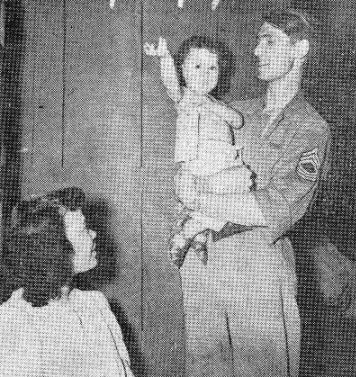
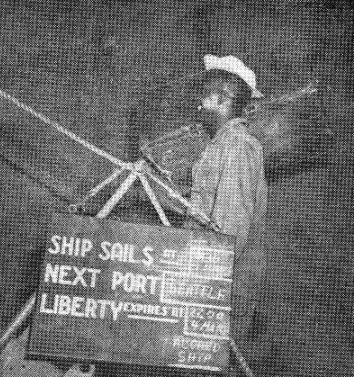
|
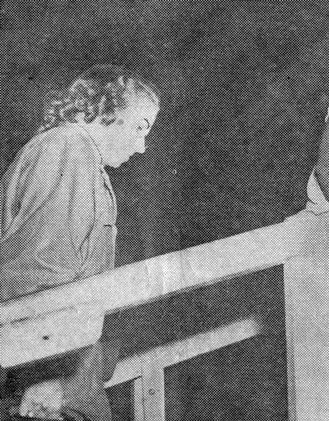
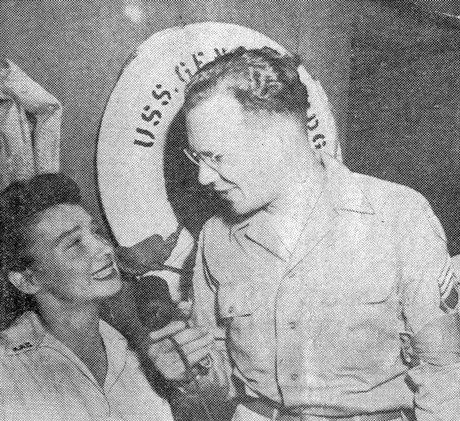
|
Going home. (Top left) M/Sgt. Lloyd H. Voight has 126 points and is only going home now. Here are two good reasons - Mrs. Mavis Voight and little Patricia Kathryne. Having met and married in Bangalore, the couple are going first to Mandan, N.D., and then probably to China, because Voight after four years overseas has re-enlisted. (Top right) This is the sign he's been looking for, and Sgt. Herman Dodson, recently of the 823rd Engineers doesn't mind the weight of his foot locker. (Lower left) This is THE moment for this Red Cross girl as she goes up the gangplank. (Lower right) A man who has been on lots of homeward-bound troop ships but has never gone home is S/Sgt. Howard Williams VU2ZU's "Man on the Deck." Here he interviews Kay Harmon of the Red Cross. Photos by Sgt. Ed Alexander, Roundup Staff Photographer)
'TIGER RAG' GETS BOOST
CALCUTTA - The Tiger Rag has been kicked upstairs.
With the move of Headquarters AAF into the Bengal Air Depot, the weekly newspaper published by Bengal Air Depot GI's has been designated by Brig. Gen. Thomas B. McDonald, IBT Air Commander, as the official AAF weekly publication for the remaining air units in this Theater.
Publication of former sheets: the India Ink of Panagarh, Slip Stream of Agra and APO-USA of Hastings Air Base, have been discontinued as these bases near the end of their operational activities, and consequently left but one AAF GI newspaper alive in the Theater.
The Rag, which goes to six pages of Indian hand-set composition, printed on a flat-bed press, is now slated to carry news and features covering AAF Headquarters, Bengal Air Depot, Assam Air Depot, Central India, Eastern, and Delta Air Depots. This will jump the run to approximately 2,500 copies each week during the next month.
Tiger Rag was adjudged by Roundup as the second best paper in the Theater during a recent GI newspaper competition.
The present editor, Sgt. Carl H. Nelson, will continue as the guiding light for the new sheet.
I-B FINANCE HANDLES 'BIG MONEY' WITH EASE
By SGT. WARREN UNNA Roundup Staff Writer
Working with six digits every day makes money really a very ordinary affair for Theater financiers.
And just as a declining market affects Wall Street, a declining Theater population crimps their style as well. In the Fall of 1944 when China and India-Burma formed one Theater, the monthly pay load was in the neighborhood of $25,000,000. Last January the I-B had a pay load of $5,768,000.
Of this, only $3,460,000 was actually paid out, since the remainder was automatically deducted for such individually authorized channels as Army insurance, war bonds and family allotments. In January, Class "B" allotments - war bonds - amounted to $149,000 in the I-B, and this does not include the bonds purchased with actual cash after pay day.
Believe it or not, there is a great deal more over-paying than under-paying. This is usually caused by paying under rushed conditions or when the payroll personnel is relatively inexperienced. The central records show up
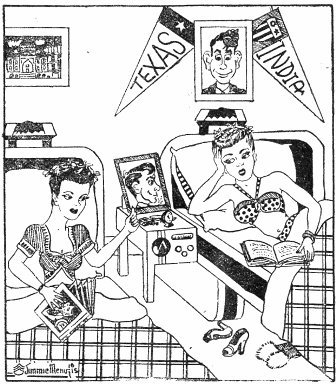
|
INDIAN RUPEES
The pay roll rupees are drawn out over here and, actually, being paid in foreign currency prevents the GI from being gypped by civilian money exchangers. But if the rupee note is torn in the lower right hand corner so that the serial number is unrecognizable, the money becomes worthless.
Since the majority of the Army pay load is procured locally, there is no need for mysterious sacks of gold and forbidding armored cars. However, every once in a while a pay load plane is flown over here so as to provide cash for the men going home. They are allowed to convert $50 worth of rupees into U.S. currency and the remainder is given in the form of a "Military payment Order," a check on the government cashable in the States.
They may reckon annual income in the millions in Hollywood but the best a man can do in the Armed Forces is $30,266 plus billing the government for recreational expenses. But that's under ideal conditions, and no five-star general or admiral gets it today.
PRIVATE V. GENERAL
It's a long leap from the $1,200 annual base pay with no trimmings of Pvt. Joe Doakes to a five-star military leader's $13,500 bas pay plus his allowances of $6,500 for quarters, $1,500 for fuel and lighting, an additional 50 percent if he is eligible for flying pay and another 10 percent for being overseas.
Major generals, lieutenant generals and four-star generals draw an $8,000 base pay and the two higher of these ranks also have personal money allowances of $500 and $2,200, respectively. A major general is allowed $120 monthly for quarters, or $105 if he is single. Normally his monthly sustenance allowance would be $42 ($21 if single) but where there are no Army officer mess halls, officers are allowed an additional $2 per diem.
In other words, a major general with his mess per diem probably receives an annual pay in the neighborhood of $11,500. This compares with the $10,000, plus mileage allowance, of a Congressman or Senator.
M/SGT. AND 2ND LT.
Does the pay of an enlisted man ever exceed that of an officer? Under equal conditions, no. But should, say a master sergeant be in India and receive the 20 percent overseas pay; while a 2nd lieutenant is also overseas, single, in the field and therefore ineligible for his quarters allowance, and only receives the 10 percent overseas pay due officers, the enlisted man would be the richer of the two.
The master sergeant in this instance would receive $165.60 a month without even adding longevity. The 2nd lieutenant would be getting $186 monthly minus $22.50 for his rations - or only $163.50. back in the States and with his troops in the field, the same bachelor lieutenant would be drawing $148.50.
Generally speaking, the two most frequent reactions to the Army's pay system are: "Some never had it so good" and "It's r-rough!" Claim your money and take your choice.
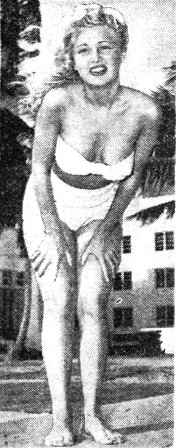 Janie Hansen will represent Miami Beach in the "Miss Stardust" beauty contest. The winner receives $500 cash.
Janie Hansen will represent Miami Beach in the "Miss Stardust" beauty contest. The winner receives $500 cash.
|
GI Goes To Movies - Cinema Guerre, Eh?
By SGT. STAN CUTLER Radio Wallah Turned Moviegoer
If you're ever taxiing around Calcutta or Delhi, and get the bright idea of going to the movies, don't. It's not so bright, I know. I went through that same smartie phase, too, and the back of my neck gets crimson when I think of it.
Let's suppose, however, that you are new around here, and you decide to while away an hour or two. You pick any one of the four theaters, and off you go.
Being new, you get a seat in the dress circle (Sucker's Row, to the initiated). This sets you back about three ten. That's Rupees three, annas ten; the American equivalent being a pack of Camels. Now we'll assume that you knew about the change in time, and didn't have to wait a half hour, and that you didn't get one of those trick seats which collapses, amidst gales of laughter from the audience. There are three of these in each of the four theaters, or "twelve" as the natives say.
Since you are fortunate enough to have none of the above happen to you, you settle back, as the house lights dim. They're no really dimming, they're shot to hell. Ever since that joker put an anna in the fuse box, they've been sluggish - they're over 35 you know.
You watch the ads flash on the screen. These are meant to be taken in at a glance, since only two seconds are allotted to each. One can observe wonderfully salacious effects by reading just the first line of each. (Bet you'd never of thought of that yourself). This gets boring, however, after the first half hour, so you seek diversion.
Perhaps you go to the gents cloak room. Now there's a place! On second thought, that's worth keeping for another time. You don't go to the cloak room at all; you go to the bar.
POOR MAN'S COKE
"What'll it be, George?" quips the bearer in humorous Hindustani. The house recommends Vimpto, the poor man's coke. Okay, you settle back and the first of a series of buzzers rings to indicate some activity or other in the theater. You rush madly back to your seat.
About this time the ads are through, and the coming attractions for the next six months flash gaily on the screen. Not only for this theater, but for the other three as well, accompanied by a Dhapla, as 63 musicians stand by (ever hear tell of Phatreelo?)
Next, Disney puts in his bid, with the best in animation for 1931, 1932 and 1933.
Information Films of India is heard from. Something like How to Brush your Child's Teeth, or How to make Mold from Penicillin.
These are followed, in rapid succession, by three Port O'Calls, two Fitzpatrick Traveltalks, and a brief announcement to the effect that Lalunal is wanted on the phone in the outer lobby.
PLENTY OF TRAILERS
The man next to you grubs a cigarette, and you can tell by the light that it is time for the main feature. This, you will be pleased to know, has been passed by the Bombay Board of Censors, under an Act of 1928; runs 7,352 feet, and has seven reels. The title has been changed from "Your father's Moustache" to "Mahabba's Mistake," and features the celebrated actor, Herbert Yklamiskrow.
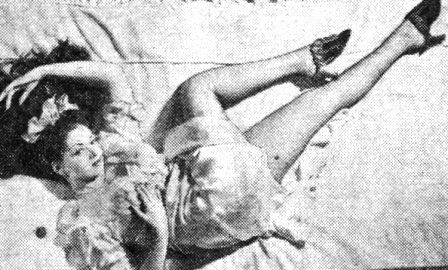 Zorita, New York burlesque queen, demonstrates a lesson in curves and angles. Anyone have an apple for teacher?
Zorita, New York burlesque queen, demonstrates a lesson in curves and angles. Anyone have an apple for teacher?
|
This is immediately cut, since they forgot to show the British Paramount, and the Soviet News (No.6 - Honored by the Order of the Red Banner).
By this time, we're running a bit late, so we join Herbie in the middle of a scene. The film, by the way, has been around since 1934, and is apt to be a bit scratchy, and unintelligible at times.
Herbie talks to Greshna:
"Darling, awkye now eepill do it for you, my little shrawk (laughter) iip I didn't know you better."
Along about here you think perhaps the gents cloak room should be visited at once.
By the time you get back, they are in the last scene, which is a copy of the first. The lights go on, the audience rises, a picture of the King is flashed on the screen, and everybody sings a rather clever parody on "My Country 'Tis of Thee."
My friend, as the British say, "you've had it."
(Ed. Note - We like to think of the above as basic training for those endless double features we're going back to.)

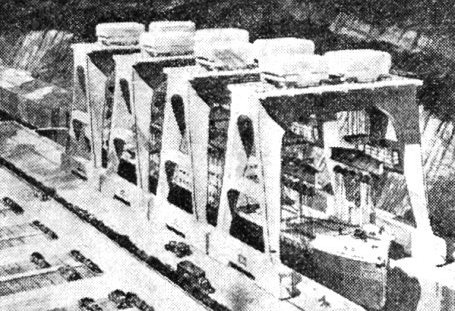
|
Aided by engineers of the U.S. Bureau of Reclamation, the Government of China is planning development of the largest irrigation and hydroelectric power project the world has ever known. (Left) An artist's sketch of the Yangtze Gorge Dam. (Right) Mammoth gantry cranes may be used to get ships past the Gorge Dam.

|
Dear Editor:
I am writing in the hope that Roundup will help me in finding out the reason why the U.S. Forces swimming pool is only open to Negro soldiers two days of each week.
Previously Negro soldiers were allowed to use the pool three days each week; then it was cut to one day each week. Now Negro soldiers can use the pool two days each week.
I can see no reason why such an arrangement exists. I believe there is no one in the Theater who really approves of such a schedule.
For the few remaining months Americans will remain in the Theater, cannot the ruling be changed so that all of the U.S. Armed Forces who wish to use the pool may do so at any time?
Pvt. Robert A. Harder, 142nd General Hospital, Calcutta
BOUQUET FOR AFRS
Dear Editor:
Will you pardon a little civilian gal for writing to Roundup, a military publication?
But, I want to say that I'm going to miss the music of America that my favorite radio station, the I-B
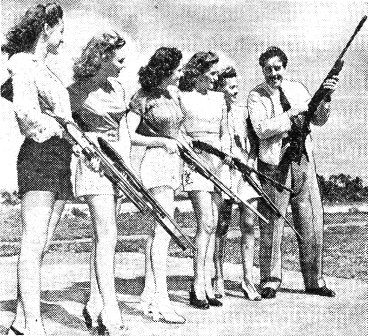 FIVE QUEENS AND A KING - That would be tough to explain in a poker deck, but it looks good here. Left to right are
Billie LeMay, Miami Fishing Queen; Jeni Freeland, Miami Fashions Queen; Libby Walker, Orange Bowl Queen; Boots Byrd,
Miami Press Photographers' Queen; Maxine Hercik, Miami Aviation Queen, and John Boles, star of the entertainment world
and a excellent trap-shooter. He's telling the gals about the art of breaking clay pigeons. Hmmmm.
FIVE QUEENS AND A KING - That would be tough to explain in a poker deck, but it looks good here. Left to right are
Billie LeMay, Miami Fishing Queen; Jeni Freeland, Miami Fashions Queen; Libby Walker, Orange Bowl Queen; Boots Byrd,
Miami Press Photographers' Queen; Maxine Hercik, Miami Aviation Queen, and John Boles, star of the entertainment world
and a excellent trap-shooter. He's telling the gals about the art of breaking clay pigeons. Hmmmm.
|
I wonder if it would be taxing the already over-taxed benevolence of Uncle Sam if the powers-that-be could possibly transfer (legally of course) these precious recordings to All-India Radio so that the lovers of the American scene may keep in touch with it through the medium of its everyday melodies? If this is only wishful thinking, well, you can't blame a gal for trying.
Thanks, fellers, for your swell service and your very swell programs. You are going to leave a mighty lonesome gal when you decide to "leave us have it!"
"The Muse Of Art" - Film and Equipment Exchange Service, APO 465 (Calcutta)
DUBIOUS POINTS
Dear Editor:
Concerning Roundup for Mar. 7, 1946:
There are a couple of dubious points we would like cleared up. You refer to Mrs. Carbone's child as both a boy and a girl. Is the baby normal?
You call James F. Byrnes Secretary of War. When did he change jobs, or is he Secretary of State, too?
It is our sincerest wish that the rest of your publication be more reputable than is shown in these articles.
With our sincerest wishes for the continued success of Roundup.
We remain, "The Inquisitive Five" - Moran Vehicle Depot, APO 629 (Chabua)
(Mrs. Carbone gave birth to a boy, quite normal from all reports. And one job for Secretary of State James F. Byrnes is quite enough, we're sure. Our red face reveals that one job seems to be all we can hold, too - Ed.)
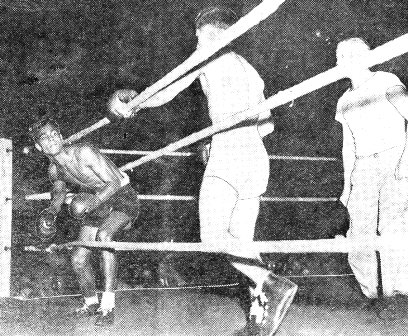 HOW'D I GET OUT HERE? - It looks like Billy Stonebody of the Royal Indian Navy is lost during his bout with Sgt.
Rocky Bennett at Calcutta's Monsoon Square Garden. But Stonebody got back in the ring and outpointed the India-Burma
GI from Camp Knox. The scrap was the feature attraction in last week's Base Section Special Service fight show
consisting of eight bouts in an all-star card. (Photo by Sgt. Mike Clavenna).
HOW'D I GET OUT HERE? - It looks like Billy Stonebody of the Royal Indian Navy is lost during his bout with Sgt.
Rocky Bennett at Calcutta's Monsoon Square Garden. But Stonebody got back in the ring and outpointed the India-Burma
GI from Camp Knox. The scrap was the feature attraction in last week's Base Section Special Service fight show
consisting of eight bouts in an all-star card. (Photo by Sgt. Mike Clavenna).
|

Sgt. Bennett Drops Decision To Indian Favorite In Feature
CALCUTTA - Two of the three American soldiers on the program scored victories and the other made a good showing against one of India's outstanding boxers last Wednesday night in an all-star fight show arranged by Base Section Special Service.
The eight-bout card at Monsoon Square Garden, the first since late January, drew 4,000 boxing fans. Fight officials are planning another show for March 27.
A newcomer to the Garden, Sgt. Rocky Bennett of Camp Knox, battled flashy Billy Stonebody of the Royal Indian Navy in the night's feature attraction. Bennett, a fast and shifty American lightweight, gave a neat display of evading the sailor's rapid punches although he dropped the decision.
Stonebody - as in all his appearances here - started swinging at the opening bell and kept boring ahead. The first and second rounds were Stonebody's on points. In the third, Bennett threatened briefly to flatten his foe, but stamina failed him.
A slugging GI from Detroit, Lucius Wilborn, had an easy time against G. Joseph of the Royal Indian Navy. It was Wilborn all the way. Wilborn came close to stopping the RIN fighter several times.
Sgt. Larry McLoughlin, the third American soldier on the bill, overcame a decided height and reach handicap to outpoint Calcutta's G. Gough. The winner pounded the taller man and took advantage of all openings to gain the nod. The crowd agreed.
All-India champions always popular in Calcutta, light-weight champ Aaron Joshua and feather-weight champ Babu Lall, went three rounds in a no-decision bout. The exhibition showed Garden fans some snappy boxing.
B. Sarkar of the Bengal Boxing Association chilled A. Joshua of the Indian Merchant Navy with a hay-making right in one minute and 59 seconds of the curtain-raiser. Other results were: G. Vincent decisioned E. Abraham; F. Sur outpointed F. Lumsden and P. Bose won over S. C.
|
Spaatz Lists
Plans For New
AAF Command
The new AAF chief named the new high command that will help him build such a force and said the air arm must be given equal status with the ground and naval services if it is to do its job effectively.
He also said that fighter groups would be equipped largely with jet planes and that bombers also would use jet propulsion. And he announced that the 16 Air Forces which existed during the war will continue as entities under the several commands.
The new setup calls for three major Combat Commands - Strategic, Defensive and Tactical - and five supporting commands.
Spaatz named Gen. George C. Kenney as Chief of the Strategic Air Command with Headquarters at Andrews Field, Md; Maj. Gen. E. R. Quesada and head of the Tactical Air Command at Langley Field, Va., and Lt. Gen. George E. Stratemeyer, Commander of the Air Defense Command at Mitchell Field, N.Y.
In the supporting commands Spaatz named: Lt. Gen. Harold L. George to continue as head of the Air Transport Command and also to serve as Director of Information on the new Air Staff. Maj. Gen. Muir S. Fairchild to command the new Air University with headquarters at Maxwell Field, Ala. Lt. Gen. Nathan F. Twining as Chief of the Materiel Command, Wright Field, O. Lt. Gen. John K. Cannon as head of the Training Command, Barksdale Field, La. Maj. Gen. Donald Wilson as Chief of the Air Proving Ground Command, Elgin Field, Fla.
He also named an 11-man Air Staff which includes Lt. Gen. Ira C. Eaker, Commander and Chief of Air Staff.
I-B Lieutenant Taking 50 'Girl Friends' To U.S.
Roundup Staff Article
When the cargo ship George Whyte sails for home from Calcutta this week there will be 50 square feet of deck space devoted to - of all things - partridges.
For that's the cargo Lt. C. C. Thompson, ADMAC Special Service officer in New Delhi, is taking home
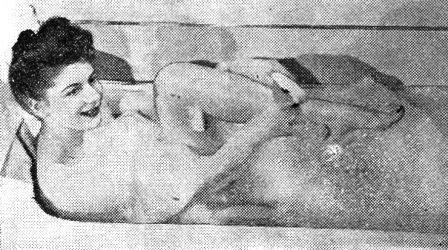 Betti Damon bubble-bathes in tub - connected new central utility unit which will be shown at the National Association
of Home Builders convention in Chicago. The tub comes complete with everything except the lovely fixture in the center
- darn it.
Betti Damon bubble-bathes in tub - connected new central utility unit which will be shown at the National Association
of Home Builders convention in Chicago. The tub comes complete with everything except the lovely fixture in the center
- darn it.
|
Thompson is taking them home to his native Arkansas to raise for hunting. He has hunted them in the Delhi area and finds them particularly delectable, not only because they are twice the size of an ordinary pigeon, but because they contain all white meat, his favorite.
He has raised pigeons in civilian life and came over to the I-B along with 6,000 of the fowl as a Signal Corps pigeon officer. Since there is a need for partridge in the U.S., Thompson wrote to the Department of Interior and gained official permission to bring the birds into the States.
Cutting Washington red tape to be allowed to bring them back was a cinch compared with obtaining the partridges. Thompson had crates and crates of male birds brought to him by Indian market merchants, but there was an embargo on the ladies. Since only one male is needed for several females, Thompson just wasn't interested in a stag party.
He finally obtained the females and now the lieutenant and his mixed company of 50 feathered friends are all set to propagate and go a hunting in the heretofore un-partridged fields of Arkansas.
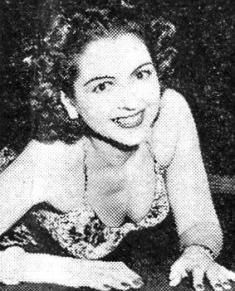 Pretty Jean Desmond of Brooklyn is one of the leading contestants for "Miss Stardust." He qualifications: Height
5'9", weight 130 pounds, bust 34 inches, waist 26 inches, and hips 36 inches. That's all the info we have.
Pretty Jean Desmond of Brooklyn is one of the leading contestants for "Miss Stardust." He qualifications: Height
5'9", weight 130 pounds, bust 34 inches, waist 26 inches, and hips 36 inches. That's all the info we have.
|
EX-'FLYING TIGERS' MAKE NOVEL FLIGHT
WALLINGFORD, CONN. - (UP) - A Douglas transport [lane manned by a crew of former "Flying Tigers" took off from New Haven Airport this week for what is believed to be the first routed commercial delivery of goods by parachute express.
The plane was chartered from National Skyway Freight Corporation by R. Wallace and Sons Manufacturing Company, silversmiths. It carried about $30,000 worth of sterling silver for delivery to customers in Newark, N.J., Pittsburgh, Philadelphia, Cleveland, Detroit, St. Louis, Chicago, Nashville, Atlanta, Birmingham, Memphis and other points.
A "baseball" type parachute was to be used for dropping cargo. The "baseball" parachute has a canopy that is a perfect half sphere when inflated. It prevents side to side swinging and lands cargo undamaged.
Marshall Back From Chinese Deliberations
WASHINGTON - (UP) - After a short talk with Gen. Douglas MacArthur in Tokyo, Gen. George C. Marshall returned here this week for consultations with Secretary of State James Byrnes and President Truman. He expects to return to China soon.
Marshall's description of the Manchurian situation as "extremely critical" and his revelation that crack American-trained Chinese Army divisions are enroute there intensified American efforts this week to solve mounting U.S.-Soviet controversies before they explode.
Earlier President Truman said he believed it may be possible to pull all American forces out of China before the end of this year, Rep. Hugh Delacy, Jr. (D-Wash.) disclosed. Delacy read the letter from Truman shortly after the House approved, 313 to 32, and sent to the Senate a bill to give China 271 surplus Navy auxiliary ships.
Meanwhile in Chungking, Generalissimo Chiang Kai-shek warned that the future of world peace depended upon the solution of problems in Manchuria and appealed to a closing session of the Kuomintang for a vote of confidence in his Manchurian policies.
Also a Central News Agency dispatch said that nationalist forces in Mukden had attacked Communist forces in the southern outskirts last Friday and had recaptured Mukden's power plant and transformer station. Electric lights and running water were restored in the city, the dispatch said.
Kellogg Meets 'Typical American Girl' In India
By SGT. CHARLES KELLOGG Roundup Ex-Editor
ALLAHABAD - Slim, dark-eyed little Edwina Furtado, who looks enough like movie star Merle Oberon to be her twin sister, has talked with just two Americans in all her 22 years of living in some of India's largest cities.
One was an American chaplain whom she met at Agra two weeks ago. The other was this humble scribe.
But the story isn't in the simple fact that this attractive daughter of mixed Portuguese, English and Indian parents has only met two Americans - there must be thousands of India's daughters who've never talked to any resident of the United States. The interest rather lies in the fact that Edwina acts, talks and thinks like an average pretty American girl and - when she can
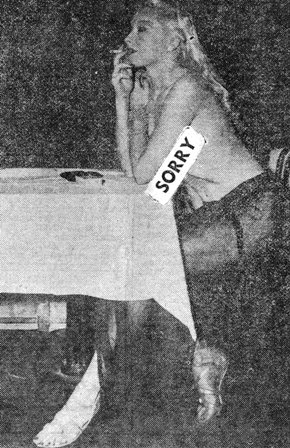 When Renie of Hollywood designed the "Window Bosom" dress, she shied away from
modeling it herself. But here it is, as ably demonstrated by a member of the floor show at Leon and Eddie's, New York. Strangely enough, she wouldn't identify herself.
When Renie of Hollywood designed the "Window Bosom" dress, she shied away from
modeling it herself. But here it is, as ably demonstrated by a member of the floor show at Leon and Eddie's, New York. Strangely enough, she wouldn't identify herself.
|
CAPABLE GIRL
Edwina is a pretty capable girl as well as being attractive enough to take home. She holds the rank of junior commander in the WAC(I), is a platoon leader over nearly 80 girls and handles what the U.S. Army calls "Information and Education" for about 200 enlisted women in her organization, and she's only been in the Women's Army Corps for about two years.
We rode down the drought-devastated miles en route from New Delhi to Calcutta and the youthful leader talked about America. She likes American things - movies, clothes, drug store sodas and the opportunities which women in the United States have for careers.
She asked us about the average wage a stenographer could make in New York City. We told her. Then she wanted to know how much a permanent cost and the price of a good evening gown - she likes them "modern, but not too daring."
Along those lines we thought of the recent idea Renie of Hollywood hit the nation's front pages with last month - the "Window Bosom" evening gown, and we asked Edwina what she thought about that.
NO MYSTERY
She smiled, "India is supposed to be the land of mystery. There wouldn't be much of a mystery about a girl wearing a dress like that," she said.
Later we got off the subject of clothes and on the subject of her marked resemblance to Miss Oberon. Her face is shaped the same and she has the same features. She's smaller though, standing about 5 ft. 2 in. in her stocking feet and weighing about 100 pounds.
How would she like to go to Hollywood? No more than she wants to go to America much as she likes American things.
"I love India. My home is here, and I'm afraid America is too cold for me." She qualified that statement though by saying that she'd like to make a trip to America some time in the future - "but I'm afraid I'd be homesick very soon."
She got off the train at Allahabad in the late evening hours. Her father was waiting on the platform, proud of his talented daughter in her smart uniform. Just before the train stopped, she asked if we'd send her something she has wanted for a long time from the United States.
"I want two books," she said. We asked what they were. "The Sears-Roebuck and Montgomery-Ward catalogues" was her reply.
STILWELL ADVISES KEEPING A-BOMB
SAN FRANCISCO - (UP) - Gen. "Vinegar Joe" Stilwell, taking over active command of the Sixth Army, said the United States should keep the atomic bomb secret, and expect to be the first nation attacked in event of another war.
"If we had a longer range field gun which hit harder or was more accurate than those of another nation, we would be under no compulsion to share the design with anyone," he added.
|
Here On 'Picture Job'
By SGT. CHET HOLCOMBE Roundup Editor
NEW DELHI - One would think that with a double-barreled name like Margaret Bourke-White - and the reputation of being one of the world's greatest photographers - she would be perhaps a bit odd, maybe even temperamental.
Such is far from the case. Coming to India for the first time, she is intensely interested in the situation here and proved to be a most charming person in a brief interview here Sunday.
"I expect to be in this country for six months," she declared. "LIFE magazine sent me here on assignment, but I'm also planning to photograph every part of the country and people of India in order to get out another book."
Looking lovely in a powder-blue sharkskin afternoon dress which blended beautifully with her blue eyes and light hair, Miss Bourke-White was fascinating.
FAVORITE CAMERA
Camera-lovers will be relieved to know that she came well prepared. "I have eight cameras, twelve lenses, and enough film to last me for some time," she said. "The Linhof, a German camera, is my favorite, using Zeiss-Tessar lenses.
"However, the Roloflex, an American make, is a grand piece of equipment for quick work with flash bulbs. The Graflex, although awkward and clumsy for me, is another camera that I like. These cameras, all with large-sized film, have proved much more satisfactory to me than the smaller ones like the Leica."
She declared that she is also planning to take some airplane pictures of some parts of India. She is spending a few days in Bombay this week, plunging right back into that work that has carried her to more than 30 countries and brought her international fame.
It was hard to realize that this slight, very feminine lady is a veteran of several European war fronts. Once a U.S. Navy ship on which she was a passenger was torpedoed. She flew on two air missions, the first with Gen. "Jimmy" Doolittle's Command in a bombing raid on the El Ouina airfield outside of Tunis in which over 100 German planes were knocked out. The other was in a tiny L-5 artillery observation plane which was attacked by five Nazi craft.
GREAT HEARTBREAK
One of her greatest heartbreaks was when she took 800 pictures of the "forgotten front" in Italy, some that "I was very excited about," spending weeks just as far forward as they would let her go. The pictures concerned bitter fighting in the heavy snows in the mountainous sectors of the north. It was the toughest job she ever had, Miss Bourke-White said. And then the negatives were all stolen out of a jeep and never found.
"I went back and did the thing all over again," she sighed. "But the snows had melted and I just couldn't seem to get anything like the quality of shots I did before."
ARMY AT WAR
Nevertheless, she had compiled enough pictures to get out a top-favorite book. "They Call It 'Purple Heart Valley'." It was an outstanding group of pictures of the U.S. Army at war - from GI's to generals.
Then she went to Germany and spent months picturing the fall of the Reich's great war machine. Returning to her home in Darian, Conn. last fall, she went to work compiling her newest book, "Dear Fatherland, Rest Quietly." It id a collection of 100 pictures of the last few months of the war and the first few of peace in Germany. Simon and Schuster, New York, are publishing it shortly.
In the last few years she has often photographed the late President Roosevelt, and has caught in he skillful lenses the images of Joseph Stalin in the Kremlin in Moscow, Winston Churchill, Generalissimo and Madame Chiang Kai-shek, Premier Mackenzie King of Canada and many others.
A native of New York City, Miss Bourke-White graduated from Cornell University and first became a staff member of LIFE in 1936. In 1940 she resigned from the staff and resumed her free-lance work, contributing to that magazine only on special assignments. She was formerly married to Erskine Caldwell, the novelist.
"Photography is great," she smiled. "But writing, no thanks. After six months of the toughest kind of work, I only recently finished the last chapter of the new book in London. If I had to write all the time I think I'd go crazy."
I-B Speeds Plans For Return Home Of U.S. War Dead
Roundup Staff Article
As the Senate Military Affairs Committee last week approved a bill for the return of bodies of the nation's war dead for burial in the U.S., the I-B Theater Graves Registration Service went right on with the preparatory steps for this evacuation, just as it had been doing for the past six months.
The 4,000 bodies believed to be in the I-B and Netherlands East Indies area, are being taken from their isolated locations and concentrated in three temporary cemeteries, Barrackpore, Kalaikunda and Singapore. Nearly 3,000 of these have already been recovered and buried.
The Theater Graves Registration Officer plans to have all the burials in the I-B concentrated in its two cemeteries by the middle of next month, but political unrest in the Far East Indies and Indo-China areas may hinder recovery operations at the Singapore cemetery until the end of the year.
EXTREME CARE
Extreme care is being taken to insure the absolute identification of recovered bodies, and in such instances as plane crashes, this is no easy task. Graves Registration work is for the most part voluntary and only American personnel will be allowed to handle the bodies of their fallen comrades.
One the recovery of the bodies is completed the difficult job of preparing the bodies for the return home begins. They must be re-checked for identification, embalmed where possible and placed in steel caskets aboard specially-designed ships. Congress estimates the world-wide cost of bringing home the dead to be $195,000,000 and the recovery program will probably extend into 1949.
The I-B Graves Registration operation is perhaps the most difficult in the world, for in no other area are the distances so great nor the locations of isolated burials so inaccessible. Included in its sphere besides India and Burma, are the Netherlands East Indies, the Malay States, the southern half of French Indo-China and Siam.
The Roundup is a weekly newspaper of the United States Forces, published by and for the men in Burma and India, from news and pictures supplied by staff members, soldier correspondents, Army News Service, and United Press. The Roundup is published Thursday of each week and is printed by The Statesman in New Delhi and Calcutta, India. Editorial matter should be sent directly to T/Sgt. Chester Holcombe, Hq., U.S.F., I.B.T., APO 885, New York, N.Y., and should arrive not later than Saturday in order to make that week's issue. Pictures must arrive by Friday and must be negatives or enlargements. Stories should contain full name and organization of sender. Complaints about circulation should be sent direct to Roundup Distribution Officer, Base Section, APO 465, New York, N.Y. Units on the mailing list should make notification of any major change in personnel strength or any change of APO.

MARCH 21, 1946
Original issue of Roundup shared by CBI veteran Bob Fagelson
Copyright © 2007 Carl Warren Weidenburner
TOP OF PAGE PRINT THIS PAGE ABOUT THIS PAGE SEND COMMENTS
PREVIOUS ISSUE CLOSE THIS WINDOW NEXT ISSUE
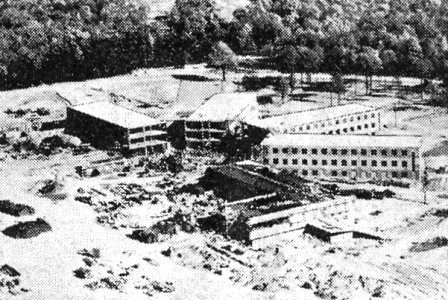 As far as unusual buildings are concerned, the Pentagon is due to have a rival in the "Cartwheelagon," the $3,400,000
cartwheel-shaped headquarters for the U.S. Continental Air Forces under construction at Andrews Field, Md. It has a
capacity for 1,500 people.
As far as unusual buildings are concerned, the Pentagon is due to have a rival in the "Cartwheelagon," the $3,400,000
cartwheel-shaped headquarters for the U.S. Continental Air Forces under construction at Andrews Field, Md. It has a
capacity for 1,500 people.
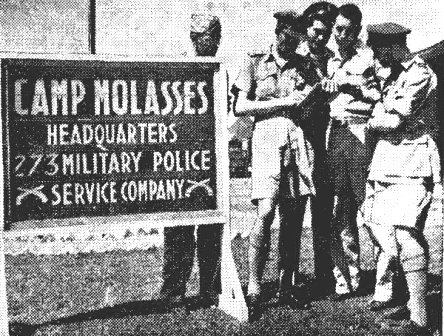 The first transfer of surplus property in Base Section to the Indian Government was at Camp Molasses in Calcutta.
Here Capts. William Owens, Kenneth Person and G. E. Gross hand over the installation to Maj. W. P. Phillips of the
British Army and Capt. N. C. Shave of the Indian Army.
The first transfer of surplus property in Base Section to the Indian Government was at Camp Molasses in Calcutta.
Here Capts. William Owens, Kenneth Person and G. E. Gross hand over the installation to Maj. W. P. Phillips of the
British Army and Capt. N. C. Shave of the Indian Army.